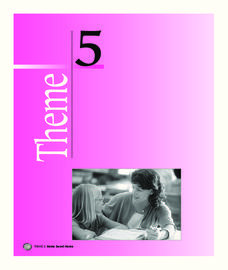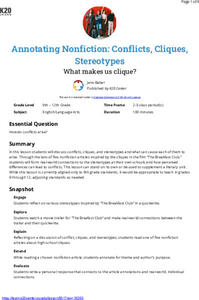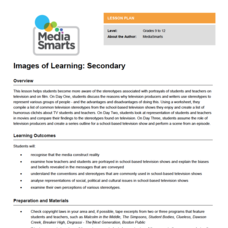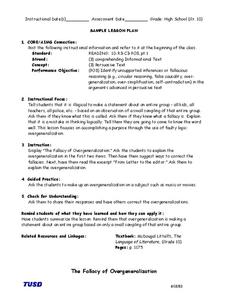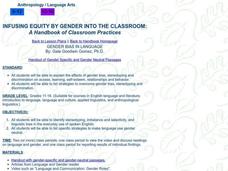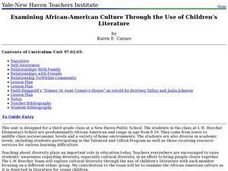Central Bucks School District
Making Generalizations
Being able to recognize patterns, craft generalizations, and draw conclusions based on information in a text passage are essential critical thinking skills. Encourage learners to hone these skills with a worksheet that asks them to read...
Curated OER
Modern Minstrelsy: Exploring Racist Stereotypes in Literature and Life
Satires may be designed to expose a bias to ridicule but if misunderstood can they reinforce that bias? Langston Hughes poem, “Minstrel Man” opens a discussion of racist stereotypes, the minstrel tradition, and the musical, “The...
Curated OER
Reading For Meaning
Select an article that explores people of another culture. After reading it as a class, distribute copies of this worksheet. It asks for a brief summary, encourages readers to make text-to-self connections, and asks learners to identify...
Curated OER
Foreshadowing and Prediction: W.W. Jacob's, "The Monkey's Paw"
W.W. Jacobs' story "The Monkey's Paw" provides plenty of foreshadowing which readers use to make predictions in this tightly composed, sound instructional plan. Your class reads the story, recording predictions and checking for veracity...
Houghton Mifflin Harcourt
Home Sweet Home: Extra Support Lessons (Theme 5)
Home Sweet Home is the theme of a unit comprised of extra support lessons. Scholars reinforce concepts through chants, grand discussions, and practice worksheets. Topics include digraphs, blending phoneme, long vowels, final sounds,...
Curated OER
In 'Other words' Writing Gently Humorous Essays About Stereotypes
Define and understand what stereotypes are by reading an article with stereotyping in it. Students will locate how it shows stereotyping and answer questions about the stereotypes. Finally, they will write their own pieces of original work.
K20 LEARN
Annotating Nonfiction - Conflicts, Cliques, Stereotypes: What Makes Us Clique?
John Hughes' The Breakfast Club takes center stage in a lesson about annotating nonfiction texts to keep track of evidence that may be used later in discussions and writings. Scholars consider the stereotypes and conflicts presented in...
Media Smarts
Images of Learning: Secondary
Make your scholars more aware of stereotypical portrayals in film and television. Discuss the definition of "stereotypes" and how they are used to present a story. High schoolers look at specific television shows and complete a chart...
Anti-Defamation League
Sneakers and Prejudice: Letters to Challenge Bias
After learning that NBA player Stephen Curry's shoes only come in boys' sizes, Riley wrote a letter sharing her concern, highlighting the gender bias and inviting Curry to take action. Scholars view a news clip, review the letters,...
National Endowment for the Humanities
Harriet Jacobs and Elizabeth Keckly: The Material and Emotional Realities of Childhood in Slavery
Young historians learn how to make generalizations based on primary sources in a instructional activity that uses the autobiographies of two women born into slavery. The class watches a historical re-enactment of scenes from the lives of...
Curated OER
Urban Legends
Irony, hyperbole, and other rhetorical devices are at play in this presentation about urban legends. Several examples of urban legends help to clarify the analysis, making it valuable for those who have a hard time wrapping their mind...
Curated OER
Flying Freudian Fun: A Look At Ethical Decision Making
There are not many more apt examples of ethics gone awry than William Golding's Lord of the Flies.. Ninth graders focus the ethics of decision making with the examples provided in the plot. They focus on the concept of the psyche and how...
Curated OER
Reading for Meaning
Students answer questions to a worksheet called Connect with Cultural Connections in order to read for meaning. In this read for meaning lesson plan, students read and answer 5 comprehension questions.
Curated OER
Guidelines for Recognizing Persuasiveness, Propaganda, and Stereotypes
Students investigate advertisements for examples of persuasiveness, propaganda, and stereotypes. In this persuasion instructional activity, students find examples of advertisements that are unusual or common. Students discuss...
Curated OER
Problem Solving and Decision Making
Help your teenagers learn to plan ahead before making a decision. With hypothetical examples and an online format, this could be a good addition to a language arts, teen issues, or health class. The format itself is not very...
Curated OER
Comparison and Contrast: Neat People vs. Sloppy People and Batting Clean-up and Striking Out
After your class reads Neat People vs. Sloppy People and Batting Clean-up and Striking Out, provide them with this resource. Use it as a quiz or a homework assignment to assess your class's understanding of the author's purpose, the...
Curated OER
Comprehending Informational Text
Do you know what a fallacy is? Discuss this term and its meaning with your class. Then, talk about why making generalizations about a large group of people isn't the best thing to do. As a group, study the included letter excerpt. It...
Curated OER
"Snapshot" Exercises & Sensory Detail Word Bank
Read a sample of creative descriptive writing to your science class. Discuss how writing can be used to record and communicate observations that scientists make. Reading selections and thought-provoking questions are suggested. Also...
Curated OER
CAN WE SWITCH GENDERS OF STORY CHARACTERS?
Analyze characters and stories to identify stereotyping. Learners will examine the concept of character gender to evaluate bias in classroom story books. They are asked to read a story or play and change the gender of the character to...
The New York Times
Collateral Damage? Researching a Connection Between Video Games and Violence
Hook your class into an exploration of and discussion about violence in video games with a cute animal clip and a video game trailer. After a quick discussion about how media can affect mood, class members read a related article and...
Curated OER
The Learning Network: Fill In 2011 Commencement Speeches
Meant to be used with the article "Words of Wisdom" also available on the New York Times website, this resource contains a fill in the blank exercise where learners complete the article by supplying missing words. Use words from the word...
Curated OER
Fairy Tales
Students listen as the teacher reads fairy tales to students and identify patterns. They listen as the teacher re-reads the fairy tales and signal or recite patterns as they listen. Students identify patterns in the fairy tales. They...
Curated OER
Children's Literature and African American Culture
Third graders examine various stories and poems and identify characteristics that make each individual unique. After analyzing the readings, they create their own personality poems to accompany self-portrait drawings. The poems and...






